Doctoral student Sean Murphy awarded NIH Fellow Transition Award

Only around 24 predoctoral to postdoctoral fellow transition awards (F99/K00) are awarded each year by the National Cancer Institute, a branch of the National Institutes of Health.
Newly described, atypical transporter gene shown to have role in antifungal resistance

In a recent paper, Santiago-Tirado and his colleagues describe a gene they discovered that increases the chance for drug resistance in the fungi Cryptococcus neoformans.
Notre Dame receives record-breaking $244 million in annual research awards
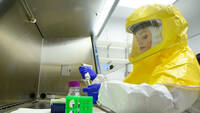
During fiscal year 2022, researchers at the University of Notre Dame received $244 million in research award funding, surpassing the previous record of $222.7 million set in fiscal year 2021.
Lymphatics help ‘seed’ early brain cells in zebrafish

A recent paper in Nature Neuroscience by University of Notre Dame biologist Cody J. Smith demonstrated how lymphatics — which remove waste from the rest of the body — are also associated with microglia and brain development in zebrafish.
Notre Dame makes historic compensation investment, surpassing $75 million

Citing the perseverance and extraordinary contributions by members of the University of Notre Dame community over the past two years, President Rev. John I. Jenkins, C.S.C., today announced a historic $25 million commitment to increase the base compensation for eligible hourly and salary University staff, faculty and student workers.
University of Notre Dame researchers discover how proteins move cargo across TB cell wall

A new study conducted at the University of Notre Dame unraveled a mystery scientists had previously not been able to pinpoint: There is an order to how disease-causing substrates, or “cargo,” cross a similar bacteria’s unique two-walled membrane.
Summer Undergraduate Research: Five Students Weigh in on What They're Researching and Learning
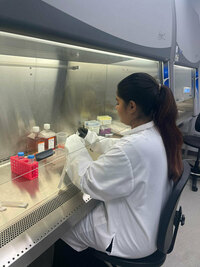
Students with any major can conduct undergraduate research at Notre Dame and many students choose to conduct their research in the summer months. Some students work in labs, some partner with professors for special projects, and many find themselves traveling throughout the United States and…
Faculty members receive awards for teaching, research, and advising

Three College of Science faculty members received awards during the 2022 Dean’s Luncheon for their work in either research, teaching, or advising.
Class of 2022 College of Science Seniors honored at annual luncheon
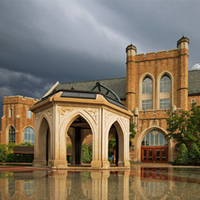
More than 50 seniors and 11 faculty members were recognized for outstanding achievements during the University of Notre Dame’s College of Science Dean’s Awards Luncheon.
MNID is Back!

MNID is back! The only regional meeting focusing on fungal and parasitic infections, an excellent opportunity for the Midwest mycology and parasitology community to meet in a relatively small group and learn from…
It All Comes Back to Zebrafish: One Postdoctoral Researcher’s Full-Circle Career
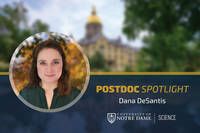
What do the eyes of fruit flies and the larval development of zebrafish have in common with the human nervous system? A lot, according to postdoctoral researcher Dana DeSantis, who works in the lab of Cody Smith at the University of Notre Dame.
WNIT to air Notre Dame College of Science’s “The Christmas Lecture” on April 20
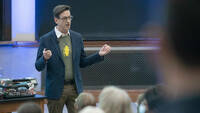
WNIT, the South Bend-Elkhart region’s public broadcasting television station, will air on Sunday (April 3) and April 20 “The Christmas Lecture: Unwrap the Magic of Science,” a new event sponsored by the College of Science at the University of Notre Dame.
HCRI Celebrates 10th Annual Cancer Research Day
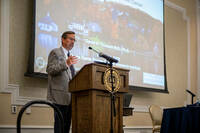
What happens when researchers-in-training are unable to present their data to a live audience or to see the results of work performed by their peers for over two years due to a global pandemic? A very enthusiastic in-person conference! The 10th Annual Cancer…
Sean Cavany: Statistically Studying the Spread
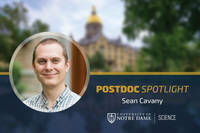
A strong background in mathematics and statistics has allowed postdoctoral researcher Sean Cavany to address one of the most pressing issues of modern times: the spread of infectious disease.
New pathway for DNA transfer discovered in tumor microenvironment

University of Notre Dame researchers have discovered another way tumor cells transfer genetic material to other cells in their microenvironment, causing cancer to spread.
Novel liquid coating on urinary catheters may reduce infections, Notre Dame study finds

A new type of catheter, described in a recent paper in eLife, could potentially improve quality of life and reduce deaths related to bloodstream infection caused by catheter-induced urinary tract infections (CAUTI).
Notre Dame ecologists honored with Society for Freshwater Science Career Awards

The Society for Freshwater Science (SFS) has recognized two University of Notre Dame faculty members, Gary Lamberti and Jennifer Tank, from the Department of Biological Sciences, with 2022 SFS Career Awards.
Studying the Forever Chemicals in Our Fish as Food: Postdoctoral Work by Daniele de Almeida Miranda
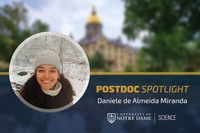
Postdoctoral researcher Daniele de Almeida Miranda has had a career spanning several countries and scientific disciplines, but has one goal in mind: to keep the environment safe.
Champion appointed new Director of Postdoctoral Studies in the College of Science

Patricia A. Champion, Ph.D., Professor of Biological Sciences, has been appointed the inaugural Director of Postdoctoral Studies in the College of Science. In this role, Champion is responsible for creating a training curriculum for postdoctoral scholars that provides skills to help them thrive in their future careers.
